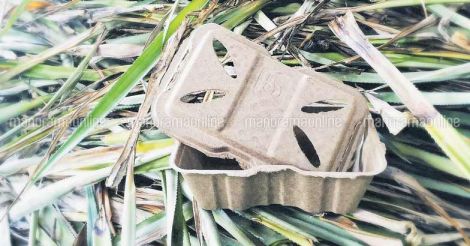Packaging accounts for most of our plastic waste and it’s often completely unnecessary. Although the government has banned plastic packaging materials, the alternative solutions are inadequate and do not effectively reach the masses. For the same reason, Hamburg-based German company Biolutions’ plant at Bengaluru, which produces plastic free packaging materials, deserves a special applaud.
At their plant in Jakur, Thirumanahally, organic wastes such as leaves and flowers from agricultural fields are powdered and turned into a pulp by mixing with water, and then made into beautiful boxes, plates and cups by putting them in hot molds. The whole process is one hundred percent environment friendly as it does not require any sort of chemicals or glue. You can throw it away after use without the burden of polluting the earth, as it is completely biodegradable or can be used as fodder for cattle. The plant, which was opened in January, currently supplies only for some leading online shopping portals.
German technology: indigenous efforts
The plant at Bengaluru is headed by three Malayalee entrepreneurs, viz., Kurien Mathew, Kurien George and, George Thomas, whose vision and commitment compelled them to adopt the idea of Biolution in India. They owe this technology to Eduordo Gordillo, a Columbian residing in Hamburg, Germany, who spent five years to develop this path-breaking technology.
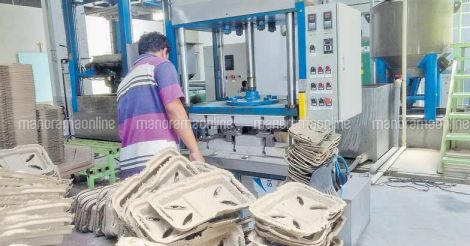
The agricultural wastes are collected from the fields of Mandya with the help of an NGO called Organic Mandya.
Kurien Mathew, managing director, Biolutions India, says that the used plates and cups can be collected and made into pulp to mold new products. The whole project is funded by German bank DEG.
Garbage to garden
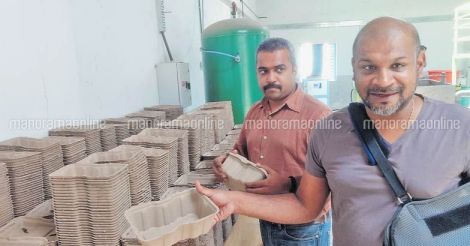
Three liters of water is used to turn a kilo of raw material into pulp and the plant’s current rate of production is a tone per month. According to Kurien George and George Thomas, Biolutions India directors, their aim is to raise this by eight tones per day. The initiators of this pollution free production unit carry an experiment as well in which seeds could be incorporated into the packing boxes. So when these boxes are thrown away after use, new plants could take life from them. They are totally against burning these products after use because the smoke might contribute to the environment hazard of global warming.
Gordillo, the founder and CEO of Biolutions, dreams of a better earth without the threat of plastics and his simple technology might be a huge contribution in making the earth a better place to live in. It would really be wonderful if you could buy a couple of tomatoes packed in a box made of tomato leaves itself or some cookies packed nicely in some cute little package made with hay.
Innovative idea
Kurien Mathew, a product design architect, met Eduordo Gordillo in China while he was working at a company called Total Brand Solutions. Gordillo’s efforts to safeguard the environment impressed the three youngsters and thus began Biolutions India’s glorifying journey in India.
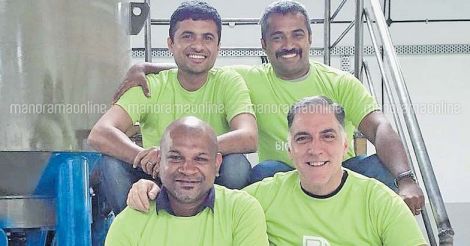
At this year’s international conference on Bio products, German-based Nova Institute honored Biolutions with ‘The Best Innovative Idea’ award. Kurien Mathew and his friends have pledged their commitment to nature and along with Organic Mandya, they intend to take this project to the next level by associating with the farmers of Mandya.
Goodbye to plastic
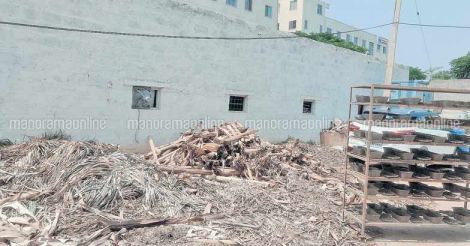
According to the Central Pollution Control Board, around 56 lakh tons of plastic wastes are produced per year in 60 Indian cities and among them, around 20 lakh tons are non-degradable and pollute the soil. The number of waste disposal units in Bengaluru alone would vouch for this horrifying rate of pollution.
It is true that in this modern industrial world, plastic products are indispensable, but we cannot ignore the fact that it could cause serious damage to earth and its beings. It is high time that we did our little bit to save earth and turn to at least a few organic methods in life.

























